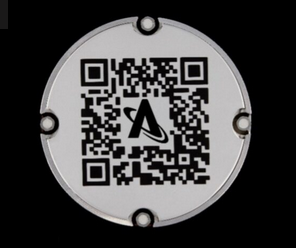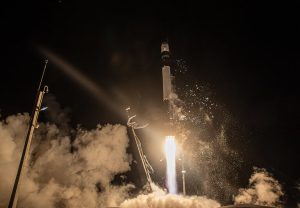Astroscale launches Gen 2 Docking Plate for satellite servicing, de-orbiting
15th Jun 2023
Space sustainability company, Astroscale, has just released its next-generation Docking Plate, giving clients the ability to de-orbit and service their spacecraft more easily. The UK and Europe subsidiary of the Japanese company announced the new technology on 13th June and hopes to make spacecraft operators “proactive in managing the end-of-life phase of their satellites”.
The Astroscale Generation 2 Docking Plate
The Docking Plate was developed and tested in the UK and is an upgraded version of the first tested in space in 2021.
In a video released by Astroscale, the company explains how the technology works. “When a client satellite needs removal or servicing, the Astroscale docking plate enables capture,” the video says. “Our docking plate is optimized for Astroscale’s heritage capture mechanism. It’s designed to enable a wide range of magnetic and robotic capture technologies to future-proof your satellites for an array of servicing opportunities.”
Any satellite that has the Docking Plate can be serviced or de-orbited by Astroscale’s capture mechanism.
According to the company, the technology “offers a practical and future-proof solution for the industry” to abide by sustainable space practices. It is designed for a long life of up to 15 years, it can be customisable to suit the customer’s needs and can be integrated right up until the end of the development phase of a satellite.
“The Generation 2 Docking Plate represents a major leap forward in enabling satellite operators to be proactive in managing end-of-life scenarios and embracing in-orbit servicing,” said Nick Shave, Managing Director of Astroscale UK.
“With its high-performance design, compatibility with various docking techniques, and advanced fiducial markers, the Docking Plate offers a practical and future-proof solution for the industry.”
Sustainable space
Space is getting busier as hundreds of satellites are launched every year. The launch of constellations, such as SpaceX’s Starlink, Amazon’s Project Kuiper, and OneWeb’s communication satellites, have already bolstered the number in orbit significantly, in a short amount of time.
While this is ultimately a positive step forward, the downside of a busy low Earth orbit (LEO) is space debris. When a satellite reaches the end of its life, it is typically a tricky process to remove from orbit. Therefore, thousands of expired satellites remain in orbit, creating dangerous space junk.
Astroscale hopes to make this removal process easier through the Docking Plate.
“Orbital debris poses a significant threat to the space environment and active satellites. The Generation 2 Docking Plate addresses this issue,” Astroscale says. While also addressing the technical challenges associated with in-orbit servicing, the Docking Plate will offer a cost-effective solution for de-orbiting satellites.
“Astroscale is actively supporting the UK’s space sustainability strategy and helping satellite operators become responsible and proactive stewards of space,” the company continued.
The announcement comes only weeks after Astroscale joined other European space organisations by signing the Statement for a Responsible Space Sector on May 25th. The agreement is led by the European Space Agency (ESA) and aims to establish the sustainable development of the space industry and was signed by 23 other companies and organisations.
It also follows shortly after the company was selected to help boost NASA’s Hubble Space Telescope’s orbit by 50 kilometers.







Thank you for your comment! It will be visible on the site after moderation.